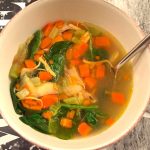Guest post by Raquela Suchinsky, MS, RD, a registered dietitian at The Mount Sinai Hospital. At Mount Sinai, Raquela focuses on nutritional management for oncology and traumatic brain injury populations.
 1. Eat a wide variety of fruits and veggies (not just citrus!)
1. Eat a wide variety of fruits and veggies (not just citrus!)
- Contrary to popular belief, there is little scientific evidence to show that vitamin C (found in citrus fruit) helps ward off or prevent the common cold, however eating a wide range of fruits and vegetables is definitely beneficial. No specific nutrient or particular food fights off illness. Choosing from a large variety of fruits and vegetables with different colors provides a multitude of nutrients, which can work together to help bolster your immune system.
2. Fill up on fluids
- It’s easy forget to drink water when the temperatures outside are in the single digits, but it is vital to stay hydrated during the winter. Once cold or flu symptoms have blossomed, it is essential to load your body up with non-caffeinated beverages to prevent dehydration. Warm fluids in particular (think hot ginger tea or chicken soup) can further help alleviate congestion and loosen mucous. If you have a hard time drinking water in the winter, stay hydrated with herbal tea or plain hot water with lemon and mint.
- Cleanses are exceptionally popular at this time of year (New Year’s resolutions anyone?). However, juice cleanses and soup cleanses (a new, winter friendly, fad!) deprive your body of essential nutrients and can diminish your immune system’s cold fighting power. Making sure your diet includes protein (chicken, fish, lentils), whole grains (whole wheat bread or pasta), healthy fats (avocado, olive oil) and fruits and vegetables will ensure that you’re nourishing your body to be the strongest it can be.
4. Practice proper food safety
- It’s important to take the appropriate steps to help avoid illness. Washing your hands frequently, especially before eating, is key! Food safety is always important, but it is good to take extra precautions during flu season. Make sure to wash all fruits and vegetables thoroughly and cook all food to appropriate temperatures to kill off bacteria. It is always important to store refrigerated foods in the refrigerator as soon as possible, even when it’s cold outside. When feasible, avoid eating with (or sharing food with!) friends and family members who are feeling under the weather.
5. Exercise regularly
- Keeping up with a regular exercise regimen maintains your body’s optimal health, which can have a beneficial effect on your immune system. Furthermore, some research has suggested that exercise supports immune function by promoting good circulation. If you aren’t brave enough to bundle up and exercise outside, try a new workout such as yoga or indoor cycling.


Thanks for these great winter health tips!